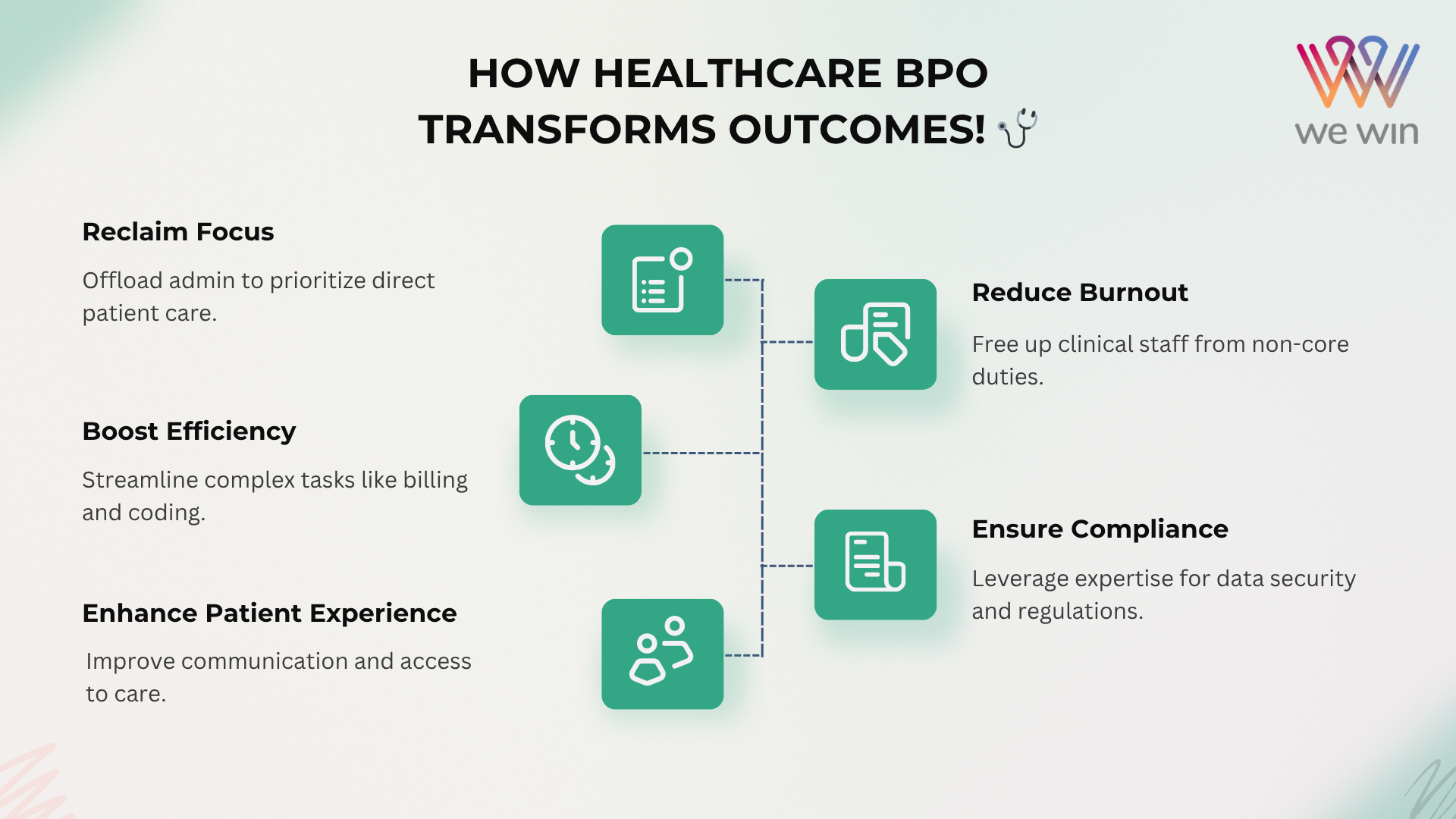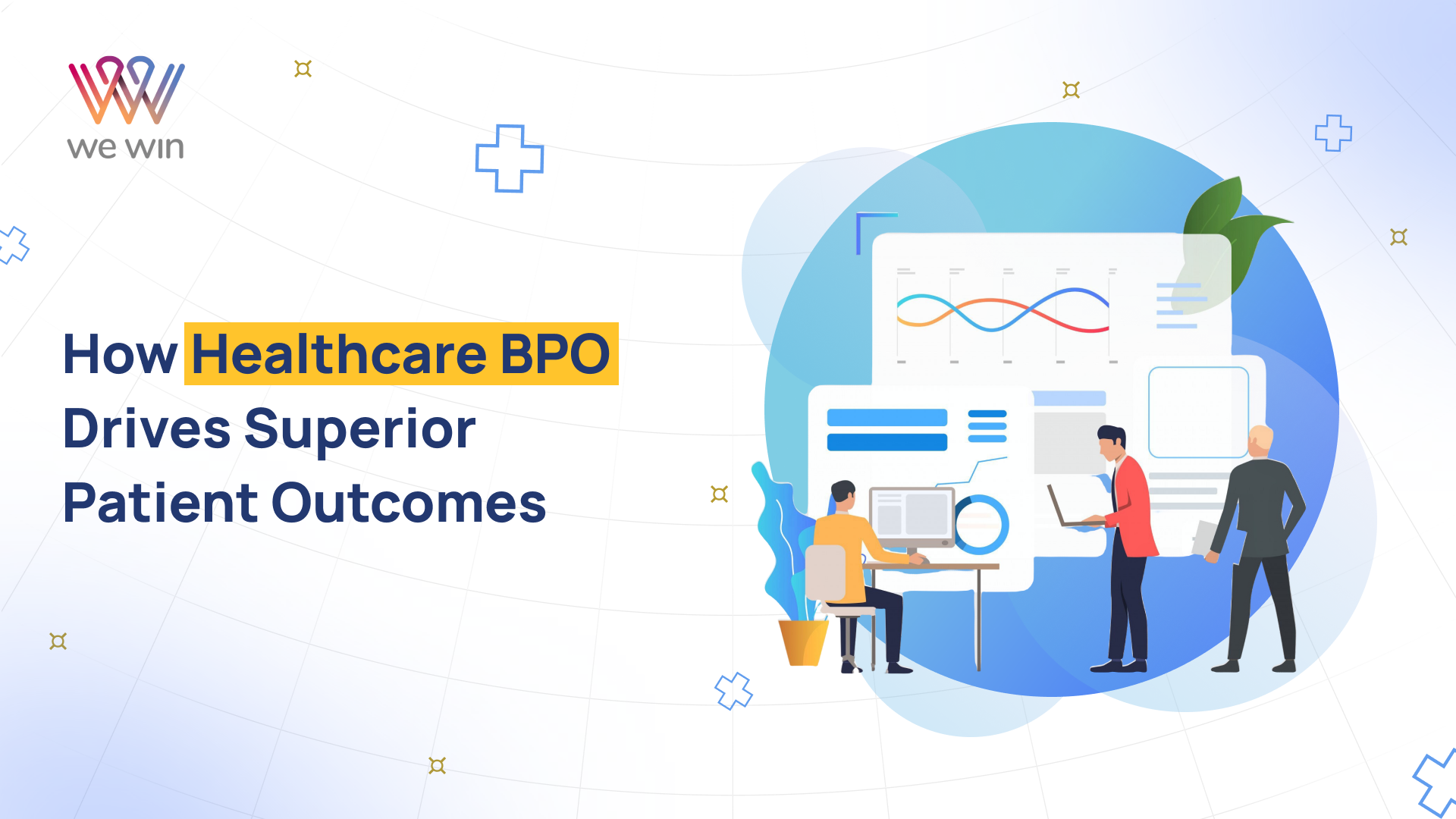Key Takeaways -
- Healthcare BPO strategically offloads non-core administrative functions, allowing healthcare providers to re-focus on direct patient care and improve patient outcomes.
- BPOs handle critical tasks such as medical billing and coding, claims processing, patient engagement, data management, and telehealth support, ensuring efficiency and compliance.
- Direct benefits include enhanced patient engagement, improved access to care, reduced administrative errors, faster turnaround times for critical processes, and 24/7 patient support.
- Indirect benefits encompass cost savings (reinvested in care), reduced clinician burnout, enhanced data security and regulatory compliance, access to specialized expertise, and operational scalability and business continuity.
- By partnering with a specialized BPO like We Win Limited, healthcare organizations can achieve operational excellence and elevate the standard of patient care.
Reclaiming Focus in a Complex Healthcare Landscape
In the dynamic and ever-evolving landscape of healthcare, providers face a multifaceted challenge: delivering exceptional patient care while simultaneously navigating a labyrinth of administrative complexities, escalating costs, and stringent regulatory demands. The core mission of any healthcare organization is to ensure optimal patient outcomes – a goal that requires unwavering focus, significant resources, and highly skilled clinical professionals. However, the increasing burden of non-core, yet critical, operational tasks often diverts valuable time, attention, and financial resources away from this primary objective.
This is where Healthcare Business Process Outsourcing (BPO) emerges not merely as a cost-cutting measure, but as a strategic imperative. Healthcare BPO involves entrusting specialized third-party providers with various administrative, financial, and support functions that, while essential, are not directly related to patient diagnosis or treatment. From intricate medical billing and coding to comprehensive patient engagement services and robust data management, BPOs offer a lifeline to healthcare organizations grappling with operational inefficiencies.
This article will delve deep into how strategic partnerships with BPO providers enable healthcare companies to streamline their operations, enhance efficiency, and, most critically, refocus their invaluable resources and expertise on what truly matters: improving patient outcomes. We will explore the direct and indirect ways BPOs contribute to a patient-centric healthcare ecosystem, examining how they facilitate better access to care, reduce administrative burdens on clinical staff, and ultimately foster an environment where patient well-being is paramount.
The Modern Healthcare Dilemma: Balancing Patient Care and Administrative Demands
The healthcare industry today operates under immense pressure, a complex interplay of rising patient expectations, technological advancements, evolving regulatory landscapes, and persistent financial constraints. While the Hippocratic Oath and the commitment to patient well-being remain at the heart of every healthcare professional, the reality of modern practice often involves a significant diversion of resources towards administrative and operational necessities.
Healthcare providers must contend with complex medical billing and coding requirements, involving thousands of codes (ICD-10, CPT) and constantly updated regulations. Errors in coding can lead to claim denials, delayed reimbursements, and significant revenue loss. Claims processing and denials management require detailed investigation, documentation, and resubmission, creating a significant drain on resources. Regulatory compliance, particularly with HIPAA for patient data privacy and security, is non-negotiable, with non-compliance resulting in hefty fines and legal repercussions.
Patient data management through Electronic Health Records (EHR) systems requires significant IT infrastructure, technical expertise, and staff training. Appointment scheduling, patient communication, and follow-up coordination consume substantial staff time. The healthcare industry faces persistent staffing shortages, particularly among nurses and allied health professionals, often forcing clinical staff to take on administrative duties that detract from patient care responsibilities. Revenue Cycle Management (RCM) encompasses all administrative and clinical functions contributing to patient service revenue capture, with inefficiencies leading to significant financial losses.
These administrative burdens pull healthcare professionals away from their core competencies. Doctors, nurses, and other clinicians find themselves spending valuable time on paperwork, phone calls, and data entry rather than directly engaging with patients, diagnosing conditions, or providing treatment. This not only reduces their capacity for direct patient care but can also lead to professional dissatisfaction and, ultimately, compromise the patient experience and outcomes.
Healthcare BPO - A Strategic Partner in Patient-Centric Care
In response to mounting administrative pressures and the imperative to prioritize patient outcomes, healthcare organizations are increasingly turning to Business Process Outsourcing (BPO) as a strategic solution. Healthcare BPO is not simply about offloading tasks; it's about forging partnerships with specialized external providers who possess the expertise, technology, and scalable resources to efficiently manage non-core functions, thereby allowing healthcare entities to dedicate their internal capabilities to clinical excellence and direct patient interaction.
Healthcare BPO encompasses a wide array of services designed to support the operational backbone of medical practices, hospitals, clinics, and other healthcare facilities. Revenue Cycle Management (RCM) services include patient registration, insurance eligibility verification, medical coding, claims submission, denial management, payment posting, and accounts receivable follow-up. Medical coding and billing services employ certified coders and billers who are experts in navigating complex medical codes, minimizing errors and accelerating reimbursement cycles.
Claims processing and adjudication handle the end-to-end claims lifecycle, from initial submission to final payment, including meticulous review, error correction, and aggressive follow-up on denied or underpaid claims. Patient engagement services extend beyond traditional call center functions to manage appointment scheduling, reminders, patient inquiry handling, pre-authorization services, post-discharge follow-ups, and telehealth support.
Data management and Health Information Management (HIM) services offer data entry, medical transcription, record abstraction, and data analytics, ensuring data integrity and compliance with regulations like HIPAA. Back-office support includes administrative tasks such as data entry, document management, payroll processing, HR support, and IT helpdesk services. Telehealth support provides technical and administrative assistance for virtual appointments, troubleshooting technical issues, and managing virtual consultations.
Reputable healthcare BPOs integrate seamlessly with healthcare providers' existing systems and teams, acting as a true extension of their operations. This partnership model is built on specialized expertise, scalability and flexibility, access to advanced technology including Robotic Process Automation (RPA) and Artificial Intelligence (AI), and a focus on compliance and security with strict adherence to HIPAA, HITECH, and other data protection laws.
How BPOs Directly Impact and Improve Patient Outcomes
The most compelling argument for healthcare BPO lies in its direct and measurable impact on patient outcomes. By optimizing administrative and support functions, BPOs create an environment where healthcare providers can dedicate more time, resources, and focus to clinical care, leading to tangible improvements in patient health, satisfaction, and overall experience.
Enhanced patient engagement and communication through BPOs managing patient-facing administrative tasks such as appointment scheduling, reminders, pre-registration, and post-visit follow-ups leads to better patient adherence to treatment plans, reduced no-show rates, and increased patient satisfaction. Improved access to care through BPO management of virtual care platforms and telehealth support helps overcome geographical and logistical barriers, particularly crucial for chronic disease management, mental health services, and preventive care.

Reduced administrative errors and denials through specialized BPO teams with deep expertise in medical coding, billing, and claims processing significantly reduce errors that often plague in-house operations, resulting in faster reimbursements and less financial burden for patients. Faster turnaround times for critical processes through optimized workflows and automation technologies accelerate administrative processes, enabling quicker pre-authorizations and efficient processing of medical records.
24/7 patient support and inquiry resolution through round-the-clock patient support services significantly enhance patient convenience and satisfaction, ensuring urgent non-clinical questions are addressed promptly and preventing minor issues from escalating [20].
The Ripple Effect: Indirect Benefits of BPO on Patient Outcomes
Beyond direct contributions, healthcare BPO creates a powerful ripple effect throughout the organization, leading to numerous indirect benefits that ultimately enhance patient outcomes. Cost savings through outsourcing non-core functions result from economies of scale, reduced overheads, and optimized processes, with financial resources reinvested directly into patient care initiatives such as hiring more clinical staff, acquiring advanced medical technologies, or expanding facilities.
Reduced clinician burnout and enhanced focus occur when administrative burdens are offloaded to BPOs, freeing clinical staff from time-consuming, non-clinical duties. When clinicians can focus primarily on diagnosing, treating, and caring for patients, their job satisfaction increases and burnout risk decreases, directly translating into higher quality care and improved patient safety.
Enhanced data security and regulatory compliance through reputable healthcare BPOs specializing in navigating complex healthcare regulations protect sensitive patient information from breaches and misuse, building patient trust and confidence while avoiding compliance violations. Access to specialized expertise and best practices from BPO providers working with multiple healthcare clients brings collective knowledge and experience, leading to more efficient administrative processes and faster adoption of new technologies.
Scalability and business continuity through BPOs offering inherent scalability allow healthcare providers to quickly adjust administrative support based on fluctuating patient volumes or unexpected crises, ensuring patient care is not disrupted by administrative bottlenecks.
We Win Limited - Your Partner in Achieving Patient-Centric Excellence
In the complex and demanding world of healthcare, choosing the right partner for Business Process Outsourcing needs is paramount. We Win Limited stands as that strategic partner, dedicated to empowering healthcare organizations to achieve operational excellence and elevate patient outcomes.
At We Win Limited, we recognize that every healthcare provider faces unique challenges. Our approach offers tailored healthcare BPO solutions designed to integrate seamlessly with existing operations, address specific pain points, and align with the overarching mission of patient-centric care. Our commitment extends beyond mere task execution; we become an extension of your team, working diligently to optimize administrative and support functions so you can focus on core clinical responsibilities.
We Win Limited brings a wealth of experience and deep understanding of the healthcare ecosystem. Our teams comprise highly trained professionals proficient in BPO processes and possessing specialized knowledge in medical terminology, coding standards, regulatory compliance (including HIPAA), and patient communication protocols. We leverage cutting-edge technology and best-in-class practices, investing in advanced automation tools, secure data management systems, and robust communication platforms.
Our services are meticulously designed to directly and indirectly contribute to improved patient outcomes through optimized Revenue Cycle Management, enhanced patient engagement, reduced administrative burden on clinical staff, guaranteed compliance and data security, and scalable and flexible support. We measure our success by your success and, ultimately, by the improved health and satisfaction of your patients.
Conclusion - A Strategic Imperative for Patient-Centric Healthcare
In an era where healthcare providers are continually challenged to do more with less, the strategic adoption of Business Process Outsourcing has emerged as a powerful catalyst for change. Far from being a mere cost-cutting exercise, healthcare BPO is a transformative strategy that enables medical organizations to shed administrative burdens, optimize their operations, and re-center their focus squarely on patient outcomes.
By entrusting non-core functions such as medical billing, claims processing, patient engagement, and data management to specialized BPO providers, healthcare entities can unlock significant efficiencies, reduce operational costs, and gain access to advanced technologies and expertise. This strategic shift frees up valuable time and resources for clinical staff, reduces clinician burnout, enhances data security and compliance, and ultimately allows for greater investment in direct patient care initiatives.
The true measure of success in healthcare lies in the well-being and satisfaction of patients. Healthcare BPO directly contributes to this by improving patient access to care, streamlining communication, minimizing administrative errors, and ensuring faster turnaround times for critical processes. The indirect benefits, such as cost savings reinvested in clinical advancements and a more engaged, less burdened clinical workforce, further amplify this positive impact.
Choosing the right BPO partner is essential. A partner like We Win Limited, with its deep industry knowledge, commitment to compliance, and patient-centric approach, can seamlessly integrate with your operations, providing the support and expertise needed to navigate the complexities of modern healthcare. By leveraging the power of strategic outsourcing, healthcare organizations can not only survive but thrive, ensuring that their primary mission – delivering exceptional patient care and achieving superior patient outcomes – remains at the forefront of everything they do.
Ready to transform your healthcare operations and elevate patient outcomes? Contact We Win Limited today to discover how our tailored healthcare BPO solutions can empower your organization.
.png)
%402x.svg)




